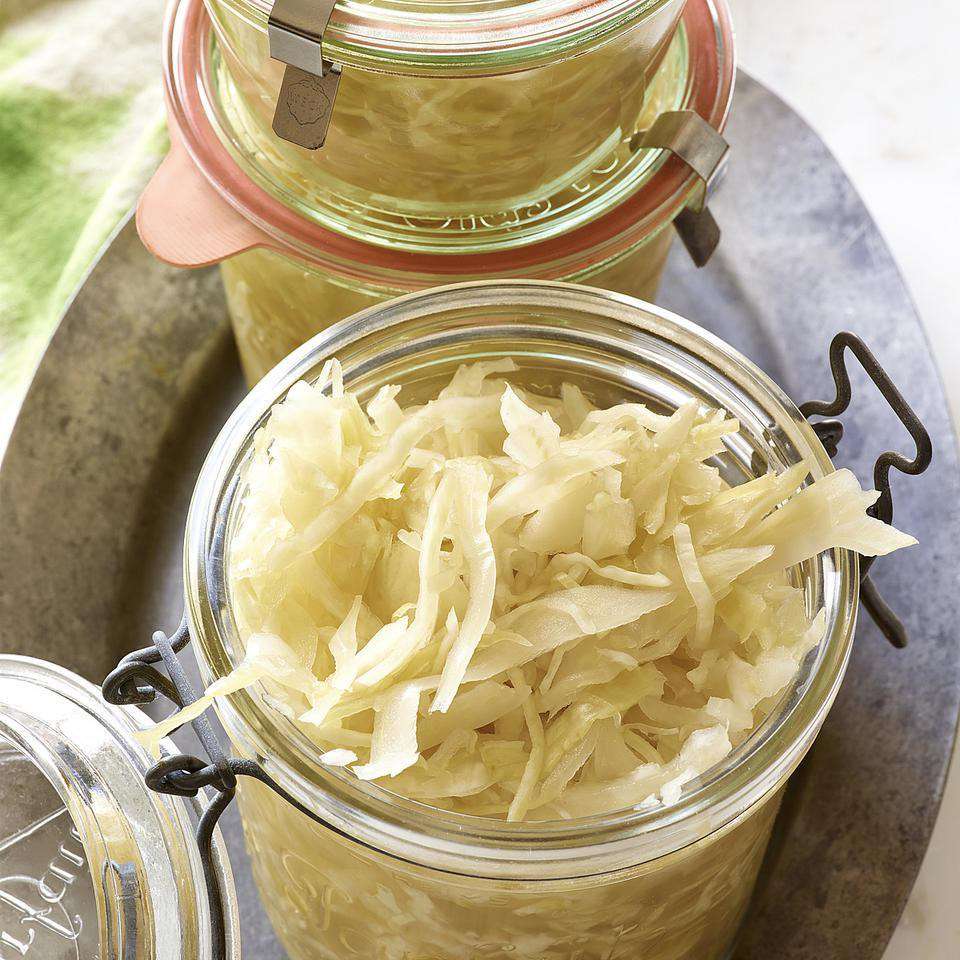Surprising Health Benefits of Sauerkraut

From shot-sized drinks of sauerkraut juice to topping a perfectly-grilled hotdog with a big pinch of kraut, how healthy is this fermented veggie? And how should you eat it? We'll tell you. Learn what's in sauerkraut, why it's good for you, which version you should buy and eat, and how much sauerkraut is too much (want to make your own? Get our recipe for Simple Sauerkraut).
Nutrition Facts: What's in Sauerkraut?
In a 1/4-cup serving, there are:
Calories: 10
Protein: 1g
Fat: 0g
Carbohydrate: 1g
Sugars: 0g
Fiber: 1g
Sodium*: 470mg
Put another way, sauerkraut is low-calorie, low-carb, and fat-free. Plus, you get some fiber, as well as vitamins A, B, C, and K, and lactic acid (more on this one later!). And although the sodium count is high compared to other nutrients, sauerkraut also delivers some potassium, which can help counter the blood pressure-raising effects of sodium (check out these other high-potassium foods).
* sodium seems to vary slightly between brands, but overall it's about 10 percent of your 2,300 milligram Daily Value cap.
How Is Sauerkraut Made?
Preserving cabbage in the form of sauerkraut is ancient. Literally. It dates back to 4th Century BC and is said to have originated in Asia. The ingredient list is super short: cabbage and salt. That said, some brands add and recipes call for adding aromatics like garlic or spices such as a caraway seed. All you really need, though, is a base of cabbage and salt and from there the cabbage spontaneously ferments and sauerkraut is "made."
The end result is preserved cabbage brimming with good-for-you probiotics (learn more about the benefits of probiotics). At least if you purchase the refrigerated kind of sauerkraut. Canned versions are pasteurized during the canning process and although canned sauerkraut tastes similar to refrigerated sauerkraut, the good bugs have been killed during pasteurization.
Why Is Sauerkraut Good for You?
In general, fermentation produces flavors but it also enriches food with vitamins and proteins. For instance, the lactic acid that is produced during the fermentation process may then help your body absorb more iron from the sauerkraut—and that's a worthy point because it is always harder to absorb iron from plant foods. Other research suggest that lactic acid can produce compounds in your body that have anti-cancer and heart-protective properties.
Also, studies have found up to 12 different strains of bacteria in spontaneously fermented sauerkraut. The presence of that bacteria—and a variety of it—encourages and supports healthy flora in your GI tract.
Most of us don't eat enough vegetables, so adding sauerkraut to your plate may be a delicious way to get you to eat more. Plus, if you choose fresh sauerkraut, you'll get some probiotics which are important for a healthy gut.
Are There Any Downsides to Eating Sauerkraut?
Although there are some great benefits to eating sauerkraut, eating more is not necessarily better. One study found eating too much may raise your risk of laryngeal cancer. And other preliminary findings suggest sauerkraut could spur some allergic reactions.
If you're watching your sodium intake closely or have high blood pressure, it may be a good idea to limit your intake and choose less salty vegetables more often.
Lastly, although there are a handful of other purported benefits to eating sauerkraut, there really isn't much, if any, scientific evidence supporting the other health claims.
How to Enjoy Sauerkraut
As with most nutrition advice—enjoy sauerkraut in moderation. Sauerkraut is an easy side dish, a tasty sandwich layer, even a worthy garnish. For the best nutrition, buy and eat the fresh, refrigerated version or make your own. Try sauerkraut in these healthy recipes.

